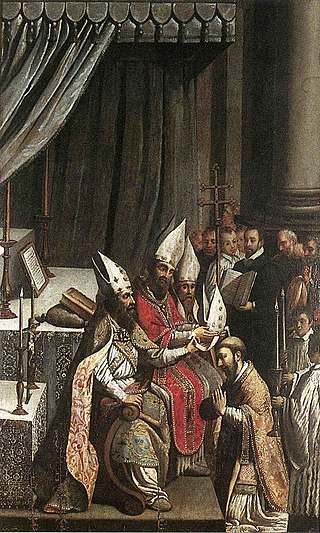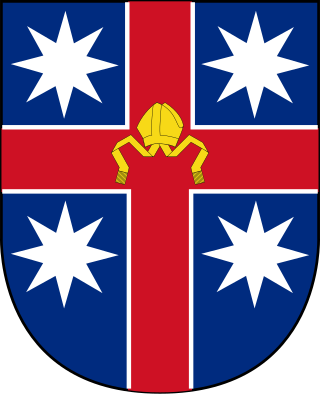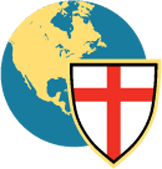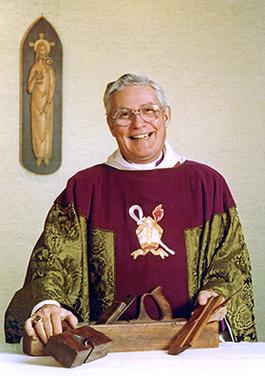
Apostolic succession is the method whereby the ministry of the Christian Church is considered by some Christian denominations to be derived from the apostles by a continuous succession, which has usually been associated with a claim that the succession is through a series of bishops. Those of the Catholic, Eastern Orthodox, Oriental Orthodox, Church of the East, Scandinavian Lutheran, Anglican, Moravian, Hussite, and Old Catholic traditions maintain that a bishop's orders are neither regular nor valid without consecration through apostolic succession. These traditions do not always consider the episcopal consecrations of all of the other traditions as valid.
This is a directory of patriarchs, archbishops, and bishops across various Christian denominations. To find an individual who was a bishop, see the most relevant article linked below or Category:Bishops.
The Continuing Anglican movement, also known as the Anglican Continuum, encompasses a number of Christian churches, principally based in North America, that have an Anglican identity and tradition but are not part of the Anglican Communion.

The Anglican Church of Australia, originally known as the Church of England in Australia and Tasmania, is a Christian church in Australia and an autonomous church of the worldwide Anglican Communion. It is the second largest church in Australia after the Roman Catholic Church.
The Free Protestant Episcopal Church (FPEC), later named The Anglican Free Communion and now entitled the Episcopal Free Communion, was formed in England on 2 November 1897 from the merger of three smaller churches. Others were to join later.
A coadjutor bishop is a bishop in the Latin Catholic, Anglican and (historically) Eastern Orthodox churches whose main role is to assist the diocesan bishop in administering the diocese.

The Anglican Church of Mexico, originally known as Church of Jesus is the Anglican province in Mexico and includes five dioceses. Although Mexican in origin and not the result of any foreign missionary effort, the Church uses the colors representing Mexico as well as those of the United States-based Episcopal Church in its heraldic insignia or shield, recognizing a historical connection with that US church which began with obtaining the apostolic succession.

The Anglican Catholic Church (ACC), also known as the Anglican Catholic Church (Original Province), is a body of Christians in the continuing Anglican movement, which is separate from the Anglican Communion. This denomination is separate from the Anglican Catholic Church in Australia and the Anglican Catholic Church of Canada.
The Charismatic Episcopal Church (CEC), officially the International Communion of the Charismatic Episcopal Church (ICCEC), is a Christian denomination established in 1992. The ICCEC is a part of the Convergence Movement. Within North America, most of the Charismatic Episcopal Church's congregations and missions are located within the Northern, Southeastern, Midwest, and Western United States; it also has a presence in Texas, and in Western Canada.

The Anglican Province of America (APA) is a Continuing Anglican church in the United States. The church was founded by former members of the Episcopal Church in the United States.
Anthony Forbes Moreton Clavier was the archbishop of the American Episcopal Church, a Continuing Anglican denomination. He was born in Yorkshire, England.

The Christian Episcopal Church (XnEC) is a Continuing Anglican jurisdiction consisting of parishes in Canada and the United States and with oversight of several parishes in the Cayman Islands. Its bishops claim apostolic succession through the Right Rev. A. Donald Davies. Davies was formerly the bishop-in-charge of the Convocation of American Churches in Europe and the bishop of the Episcopal Diocese of Fort Worth, Texas.
The historic or historical episcopate comprises all episcopates, that is, it is the collective body of all the bishops of a group who are in valid apostolic succession. This succession is transmitted from each bishop to their successors by the rite of Holy Orders. It is sometimes subject of episcopal genealogy.

Anglican interest in ecumenical dialogue can be traced back to the time of the Reformation and dialogues with both Orthodox and Lutheran churches in the sixteenth century. In the nineteenth century, with the rise of the Oxford Movement, there arose greater concern for reunion of the churches of "Catholic confession". This desire to work towards full communion with other denominations led to the development of the Chicago-Lambeth Quadrilateral, approved by the Third Lambeth Conference of 1888. The four points were stipulated as the basis for church unity, "a basis on which approach may be by God's blessing made towards Home Reunion":

The Anglican Church in North America (ACNA) is a Christian denomination in the Anglican tradition in the United States and Canada. It also includes ten congregations in Mexico, two mission churches in Guatemala, and a missionary diocese in Cuba. Headquartered in Ambridge, Pennsylvania, the church reported more than 1,000 congregations and more than 128,000 members in 2023. The first archbishop of the ACNA was Robert Duncan, who was succeeded by Foley Beach in 2014. In June 2024, the College of Bishops elected Steve Wood as the third archbishop of the ACNA. Authority was transferred to him during the closing Eucharist at the ACNA Assembly 2024 conference in Latrobe, Pennsylvania.
William Wesley Millsaps is a Continuing Anglican bishop. He is bishop of the Episcopal Missionary Church. He is the rector of Christ Church in Monteagle, Tennessee, and Presiding bishop of the Episcopal Missionary Church. He had served previously from 2001-2010. He was elected again in December 2014 at a Synod held at Christ Church, Warrenton, Virginia.
The Bartonville Agreement came from a meeting held in May 1999 by bishops representing both the Anglican Communion's American province and a number of Continuing Anglican jurisdictions in North America. As such, it was an early effort made by conservative Episcopal bishops and Continuing Anglican bishops to voice a common set of principles which might become the basis of future cooperation between their churches or dioceses. The schism that had divided these church bodies had occurred in 1977 at the Congress of St. Louis when "Continuers" met and formed a new Anglican church in reaction to changes in doctrine and practice that had been approved by the Episcopal Church and the Anglican Church of Canada.

The Traditional Anglican Church in Australia (TACA), formerly named the Anglican Catholic Church in Australia (ACCA), is the regional jurisdiction of the Traditional Anglican Church for Australia, New Zealand and Japan. The Traditional Anglican Church in Australia is not affiliated with the Missionary Diocese of Australia & New Zealand of the Anglican Catholic Church.

Archibald Donald Davies was an American Anglican bishop. A native of Pittsburgh, Pennsylvania, he became the fourth Episcopal bishop of Dallas and subsequently the first Episcopal bishop of Fort Worth. Davies was also a founder of the Evangelical and Catholic Mission, and later founded the Episcopal Missionary Church, after which he became Archbishop and Primate of the Christian Episcopal Church (XnEC).
Leon Chechemian (1848–1920) was an Armenian Christian cleric. In 1897, he was a founder of the Free Protestant Episcopal Church, and that church's first primus. He is also considered an episcopus vagans.









